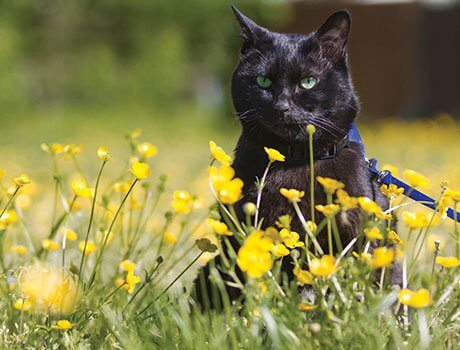Butterfly flew too high. The 15-year-old orange tabby, named for his outgoing personality, recently found himself nearly three stories up a tree after darting out of his house and being chased by a dog. Too terrified to climb down, he spent three days and nights clinging to a branch for dear life.
Thankfully, Butterfly’s guardians called PETA, who arranged for a professional tree climber to rescue the dehydrated, hungry and frightened feline. The climber also documented the rescue using his GoPro camera to serve as a cautionary tale for all cat guardians about the many perils that our animal companions face outdoors.
Getting stuck in a tree isn’t the only danger our cats and dogs may encounter now that warmer weather has arrived. Cats have been injured, lost and even killed after falling out of windows whose screens weren’t properly secured. So when warm breezes tempt you to open the windows, protect your cats by checking all your screens to make sure they aren’t torn and won’t fall out if Kitty leans against them.
Blooming flowers are a welcome sight, but pick your plants wisely: Hundreds of varieties, including tulips, daffodils, sago palms, lilies, azaleas and rhododendrons, are toxic to animals. Poisonous mushrooms can pop up in lawns overnight, and cocoa mulch and many fertilizers are also harmful. Protect your animals by keeping these plants and gardening products out of your home and yard, as well as by keeping animals indoors or closely monitored when they’re outside.

image@petmd
Warmer temperatures also mean mosquitoes—and just one bite from an infected mosquito can transmit potentially deadly heartworm disease to dogs. Conventional treatment requires multiple injections of potent drugs and keeping dogs completely still for weeks until the worms die and decompose. Even after the worms are gone, some dogs may need supportive care for a damaged cardiovascular system for the rest of their lives. Preventing this terrible disease is much simpler than treating it, so if your dog isn’t already on heartworm prevention, make an appointment with your veterinarian today to get started.
And there’s another reason to get to the vet: spaying and neutering. Longer days shift cats’ breeding cycles into overdrive, resulting in “kitten season,” when animal shelters struggle to accommodate litter after litter of homeless kittens and pregnant cats. Not only do cats’ and dogs’ “spring flings” worsen the homeless-animal crisis, they also put animals in danger of getting lost or being killed in traffic in addition to the many other threats they face when they dash out in search of mates.

From bird-watching through the window with our cats to playing fetch with our dogs at the park, warmer temperatures bring many opportunities to strengthen the bond we share with our animal companions. By taking a few precautions, we can ensure that spring and summer are as enjoyable to our animals as they are to us.
Lindsay Pollard-Post is a senior writer for the PETA Foundation






